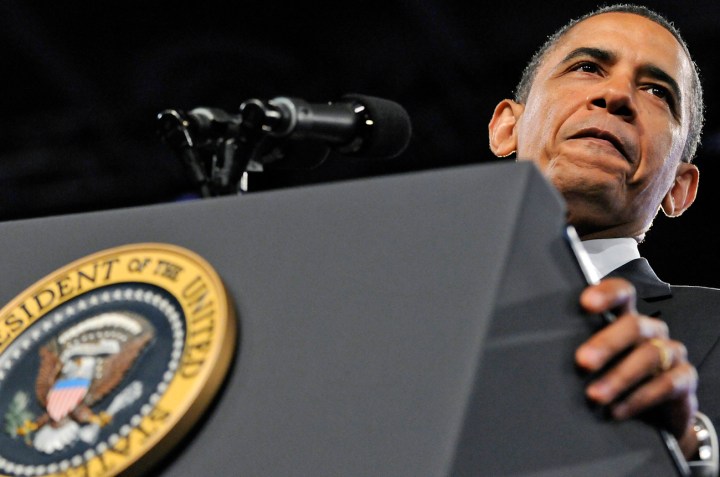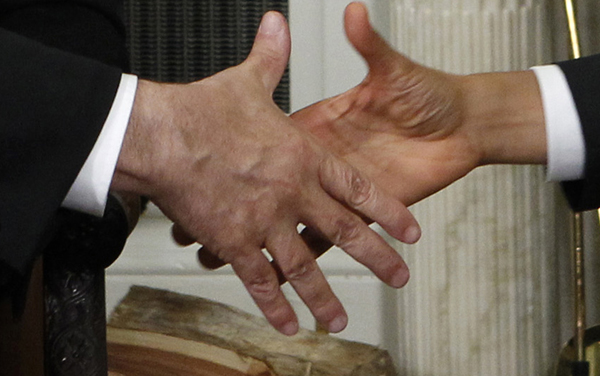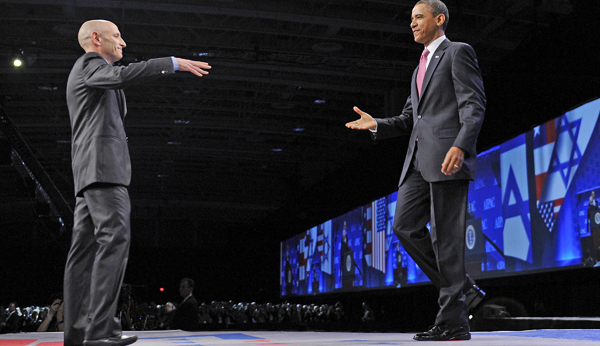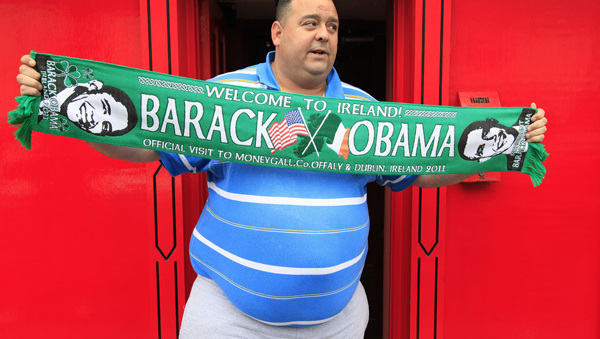Politics
Obama and the impossible problem that is Middle East

Many a US president has tried unsuccessfully to untie the knot that is the perpetual conflict between Israel and Arabs. Fresh from his Osama bin Laden victory, Barack Obama is having another go at the conundrum, swimming against the tide of opportunistic critics from within the US and Middle East players themselves. Not an easy task. By J BROOKS SPECTOR.
A mere three weeks ago, Barack Obama was, at least for a moment, all action; a president bestriding the world in his seven-league boots following the death of Osama bin Laden, courtesy of a US Navy Seal team. From the stings and humiliations of charges that he was somehow anti-American, a not-so-hidden secret multilateralist, and only prepared to lead from the rear, Obama had been transformed into a quintessential man of action – part Teddy Roosevelt, part John Kennedy, part Ronald Reagan. In fact, a growing number of conservative commentators like Ross Douthat in The New York Times publicly applauded his transformation into a president with iron and steel in his body, morphing into Bush III.
It is not too much to argue that, together with a gradually recovering economy, Obama’s successful Osama-adventure has convinced a number of wavering potential Republican Party candidates to stay out of the 2012 presidential race and rather begin planning for 2016 instead. The no-shows list now includes such solid folks as Indiana and New Jersey governors Mitch Daniels and Chris Christie, and sentimental favourite, folksy TV bloviator and former Arkansas governor Mike Huckabee. Even Donald “The Hair” Trump.
So far at least, this now seems to leave the Republican nomination up for grabs for a group of people that includes Mitt Romney, a man who has been running for his party’s nod since 2008, or former Obama administration ambassador to China Jon Huntsman (both rich, both Mormons and both former governors – of Massachusetts and Utah respectively); former Minnesota governor, Tim Pawlenty, solid cost-cutter but buzzing with all the charm of a used pizza-board; former Pennsylvania senator Rick Santorum; congresswoman Michele Bachmann and congressman Ron Paul; Herman Caine the pizza king and ex-vice presidential nominee Sarah Palin – the latter five much beloved in Tea Party circles – or just perhaps there are three more guys named Moe we don’t know about yet. Yes, Newt Gingrich has also tossed his hat in the ring, but within days of doing so he had already demonstrated his dominant personality trait – a man who lobs bombs in all directions – most recently managing to attack his own party’s congressional plans on Medicare on national television.
Watch: Obama’s Full Speech on Mideast Policy on 19th May 2011
And so, just prior to his planned visit to Ireland, the UK, France and Poland, Israel’s Benjamin Netanyahu’s visit to Washington and, as a curtain-raiser of sorts for Obama’s own speech to the American Israel Public Affairs Committee’s annual convention in Washington on Sunday, the president chose last week to redefine American policies in the Middle East. (As an historical footnote, when Obama first spoke to the AIPAC national convention in 2008 as a Democratic candidate, he supported the unity of Jerusalem as Israel’s capital – something he is less likely to be asserting this time. Candidates have more latitude, of course, and they’re on the prowl for votes, after all.) AIPAC is the very influential pro-Israel lobby that significantly, but not completely, represents and promotes mainstream Jewish opinion on things related to Israel.
On Thursday, then, in the state department’s main auditorium, Barack Obama delineated his administration’s goals in the Middle East. He laid it out cleanly that the US position is peace between Israel and the Palestinians will be defined on the basis of the pre-1967 border, albeit with adjustments for security, and that the status of Jerusalem and the fate of the Palestinian refugees are matters to be settled later. He also, of course, set out the view that the Palestinians must be prepared to negotiate through to a settlement and that all groups must eschew the violence that has wracked the region since, well, Moses was a stripling.

Photo: U.S. President Barack Obama (R) shakes hands with Israel’s Prime Minister Benjamin Netanyahu in the Oval Office at the White House in Washington, May 20, 2011. REUTERS/Jim Young
While such a position has actually been the effective starting point for negotiations among a whole generation of protagonists, whether at the White House, Camp David or Taba on the Red Sea, to many it seemed that the “new” in this statement was its formal, official, public pronouncement by a US president that the path to peace was through the lines on the old map. Predictably, sensing an opening to challenge Obama’s newfound bona fides as this bulked-up, take-charge guy after Abbottabad, Republican presidential hopeful Mitt Romney immediately charged, “President Obama has thrown Israel under the bus. He has disrespected Israel and undermined its ability to negotiate peace”. And Tim Pawlenty, freshest of the hopeful crop, chipped in that Obama’s position was a “disaster waiting to happen”, adding, “at this time of upheaval in the Middle East, it’s never been more important for America to stand strong for Israel and for a united Jerusalem”. Red meat to the AIPAC crowd for sure.
Netanyahu’s response, initially at least, was pretty truculent as well, saying he “expects to hear” a rethink from Obama and implying – well, more like saying – that Israeli politicians know more about their country’s security needs than any US president. The White House’s response, as The New York Times reported on Sunday was: “‘That was Bibi over the top,’ an administration official said (on) Saturday, referring to Mr. Netanyahu. ‘That’s not how you address the president of the United States.’
“Even many in the American Jewish community were angry. Jeffrey Goldberg, an influential columnist with The Atlantic Monthly, wrote: ‘So Netanyahu “expects” to hear this from the president of the United States? And if President Obama doesn’t walk back the speech, what will Netanyahu do? Will he cut off Israeli military aid to the US? Will he cease to fight for the U.S. in the United Nations, and in the many international forums that treat Israel as a pariah? I don’t like this word, “expect”.’”
Netanyahu and his political allies have made it abundantly clear they have just never trusted Obama. He didn’t come up through those parts of the Democratic Party that traditionally had strong ties to the Israel lobby, a key component of which is AIPAC. The committee has often been at the centre of networks where support for Israel and American domestic political alignments come together, although its critics usually manage to overplay this by trying to insist AIPAC acts Svengali-like on an unsuspecting American political system, thereby putting the US totally in the service of AIPAC’s nefarious Middle East agenda.

Photo: AIPAC President Lee Rosenberg greets U.S. President Barack Obama as he takes the stage to deliver remarks to delegates at the American Israel Public Affairs Committee policy conference in Washington, May 22, 2011. REUTERS/Jonathan Ernst.
What’s really happening is that this is one of those areas where American domestic politics are intertwined with foreign policy; in this case directed towards the Middle East. Some 78% of American Jews voted for Obama in 2008 – not too far from the average support total in recent presidential elections – and a big chunk of Democratic Party campaign contributions come from individuals who could be identified as Jewish-Americans or are related in some way to the Jewish population. But, by the same token, only about 3% of the population are Jewish. Nonetheless, Republicans clearly hope to hive off some of that support (and some of those campaign contributions) from its long-time embrace of Democrats – especially if Obama can be painted as tepid in his support of Israel.
Such a calculation, of course, assumes all American Jews are unwavering in their support for Israel, regardless of that country’s policies, and that a significant number of Jews will not support the kinds of policies Obama set out in his state department speech. J Street (a new American Jewish alliance that opposes much of AIPAC’s rhetoric and its hardline support for Israel regardless of circumstances) disagrees with AIPAC, speaking on behalf of that significant portion of American Jewry that finds it very hard to unequivocally back Netanyahu and the Likud Party’s agenda on the West Bank and negotiations. On the Democratic Party side of the ledger, because Obama won the Jewish vote in 2008, that helped him win the crucial swing state of Florida. As a result, Democratic analysts argue Obama needs to dance adroitly on this topic if he hopes to hold on to his support among those American Jews who do support Netanyahu’s hard-line stance – in addition to those who are uneasy with Netanyahu’s policies.
But there is a further domestic electoral wrinkle bound up with this posturing. Evangelical Christians, fundamentalists and “born agains” – among whom there are about 35 million voters – are now mostly Republican supporters, and, simultaneously, mostly strong supporters of hardline, right-wing Israeli position, based on eschatological readings of the Bible and its presumed prophesies. The evangelicals were a key element in George Bush’s electoral strategy in both 2000 and 2004. And so, via that harsh “throwing Israel under the bus” rhetoric from Mitt Romney, the ex-Massachusetts governor is aiming to cleave away Jewish support for a Democratic president and bolster his own credentials with that vote-rich cadre of evangelicals – something he will sorely need in the early primaries and caucuses of 2012.
Watch: President Obama at 2011 AIPAC Policy Conference.
Accordingly, when Bibi Netanyahu speaks before a joint sitting of the US Congress on Tuesday, it will be an opportunity to see how much Netanyahu is still prepared to square off, bare knuckles-style, in the US domestic arena while trawling for Republican support (and opposition to Obama’s newly-stated positions). This will also be coming after he somewhat toned down his fiery rhetoric after meeting Obama face-to-face, following Obama’s state department speech. After the two leaders’ Friday meeting, Netanyahu eventually put a slightly different spin on things, saying their talks revealed “differences” rather than equalling a major split between two close allies and friends.
Obama then delivered his now-eagerly awaited speech at the AIPAC convention Sunday morning. While offering praise for US-Israeli ties, nevertheless he declined to draw back from his positions as he had set them out on Thursday at the state department. And he took an indirect swipe back at Prime Minister Netanyahu, directly repeating the very points Netanyahu had so strenuously objected to, and adding a challenge to those people who he said had misconstrued his position. “Let me repeat what I actually said on Thursday, not what I was reported to have said.”
He argued: “The United States believes that negotiations should result in two states, with permanent Palestinian borders with Israel, Jordan, and Egypt, and permanent Israeli borders with Palestine. The borders of Israel and Palestine should be based on the 1967 lines with mutually agreed swaps, so that secure and recognised borders are established for both states.”
Obama stressed the phrase, “mutually agreed swaps,” that was the very point Netanyahu had ignored in his first riposte. Obama went on to say, “Since my position has been misrepresented several times, let me reaffirm what ‘1967 lines with mutually agreed swaps’ means. By definition, it means that the parties themselves — Israelis and Palestinians — will negotiate a border that is different than the one that existed on June 4, 1967. It is a well-known formula to all who have worked on this issue for a generation. It allows the parties themselves to account for the changes that have taken place over the last 44 years.
“There was nothing particularly original in my proposal. This basic framework for negotiations has long been the basis for discussions among the parties, including previous U.S. administrations.”
According to reporters who attended Sunday’s speech, Obama’s audience applauded these words, although those cheers were more muted than the ovations he received for other parts of his speech, such as when he spoke about Iran or when he reaffirmed US opposition to an impending United Nations vote in favour of Palestinian statehood.

Photo: A man holds a U.S. President Barack Obama souvenir scarf outside a pub in Moneygall, Ireland May 21, 2011. Obama will visit the village, in which one of his ancestor’s lived, during a visit to Ireland. REUTERS/Stefan Wermuth
Obama himself noted the intrusion of the 2012 presidential election in measuring the impact of his 1967 borders statement. As Obama said, “I know very well that the easy thing to do, particularly for a president preparing for re-election, is to avoid any controversy.” Obama added, “I don’t need Rahm [former chief of staff Rahm Emanuel] to tell me that.” Having that out of the way, Obama said that he had already told Netanyahu that, “I believe that the current situation in the Middle East does not allow for procrastination. I also believe that real friends talk openly and honestly with one another.” Score one to the president for driving right down the lane and going for that winning lay-up.
Punting Barack Obama’s new initiative, George Mitchell, the man who had been Obama’s special envoy to the Middle East for two years and who had just resigned from that position, told Christiane Amanpour on ABC TV’s “This Week,” broadcast Sunday morning, that: “I don’t believe it is threatening Israel. … A major objective of this initiative, among others, is to prevent a disaster for Israel from occurring at the UN General Assembly in September, when the Palestinians have said they will seek a unilateral declaration of statehood. … [I]t’s indisputable that we have not made as much progress [on Middle East peace] as we would have liked. … [T]here’s another definition of insanity, and that’s to give up on a valid goal because you’ve gotten discouraged and you can’t succeed.”
And on Sunday, Obama got a bit of help in setting up the crowd to be a reasonably sympathetic one when AIPAC president Lee Rosenberg introduced Obama with a guaranteed applause line: “Thank you, Mr. President, for ridding the world of Osama bin Laden”. Cue the reappearance of “Obama – man of action”.
Of course, Obama wasn’t only speaking about Israel and Palestine (or the US election next year) since this sequence of events began. Perhaps as important has been his support for a development fund to underpin the democratic gains in Tunisia and Egypt in the “Arab Spring” and his warning to regimes like those in Bahrain and Syria about standing in the way of democratic development and the right kind of future. The problem for Barack Obama is that he is trying to build democratic societies and economies on the cheap, his critics argue. The kind of money – a billion or two – being talked about for this fund is nowhere near enough to provide the support needed, say analysts.
But the difficulty in offering any more, of course, is that the snarl-up over the US budget has given the administration virtually no wiggle room in coming up with even a couple of billion for the Middle East – not while Republicans are talking about cutting foreign aid.
Obama’s speech on Sunday also took on governments like the one in Syria for their internal repression. And on Iran, the president was plenty tough as well. “You also see our commitment to our shared security in our determination to prevent Iran from acquiring nuclear weapons…Its illicit nuclear program is just one challenge that Iran poses. As I said on Thursday, the Iranian government has shown its hypocrisy by claiming to support the rights of protesters while treating its own people with brutality. Moreover, Iran continues to support terrorism across the region, including providing weapons and funds to terrorist organizations. So we will continue to work to prevent these actions, and will stand up to groups like Hezbollah who exercise political assassination, and seek to impose their will through rockets and car bombs.”
But he elided around criticism of Saudi Arabia, one of the US’s main allies in the region and an important supplier of petroleum to the global economy.
In fact, two hoped-for elements in the Obama plan for his visit to four European nations, including the G8 meeting in the French resort of Deauville, were to try to sell multilateral support for an economic development fund tied to democratic growth for Middle East nations emerging from the Arab Spring and forestall European recognition of Palestinian statehood as well. But his potential European partners are also flat out of spare cash. These nations are trying to cut their own government budgets and bring their financial houses in order as well as bolster the sovereign debt of ailing nations like Greece, Ireland and Portugal to prevent debt defaults in the euro zone that could bring down the euro. “Hmmm. An Arab development fund, you say, why can’t countries like Saudi Arabia finance it?” you can almost hear them say instead.
All of this may be why correspondents and analysts in the Middle East have so far noted how little enthusiasm Barack Obama’s recent round of speeches has generated so far. The initial judgement of the Arab street (or souk) seems to be that Barack Obama is back to being “Measured Man” again: cool, calm, and rational, but once again leading from the rear.
Perhaps that explains why the overwhelming majority of the world’s political sphere believes the Middle East is the impossible problem to solve. DM
For more, read:
- Obama: ’67 borders reflects long-standing policy in AP;
- Obama Challenges Israel to Make Hard Choices Needed for Peace in The New York Times;
- Mideast Questions Likely to Surface in Obama’s Trip to Europe in The New York Times;
- Promise of Arab Uprisings Is Threatened by Divisions in The New York Times;
- The President’s Middle East Speech (Ross Douthat’s column) in The New York Times;
- No Disrespect (a column by Peter Catapano) in The New York Times;
- Obama to pro-Israel lobby: credible peace process needed to ward off isolation of Israel in The Washington Post;
- Obama double downs at AIPAC in The Washington Post;
- PM vows to work with Obama to renew peace talks from the Jerusalem Post (and Reuters);
- PM: Disagreement with Obama blown out of proportion in the Jerusalem Post;
- Obama seeks to calm Israel row over 1967 ‘border’ in the BBC;
- Obama Reaffirms “Unbreakable” Bond With Israel in Time;
- Themes of Obama’s European tour highlight changes since his election in The Washington Post;
- Netanyahu brings starkly different vision to Obama’s White House in the Christian Science Monitor;
- Obama’s Israel Surprise in the Wall Street Journal;
- Obama speech: Mid-East reaction (early reaction from the man in the street) on the BBC;
- Putting America on Democracy’s Side (Peter Beinart’s column for the Daily Beast);
- Obama Mideast Speech: the FPB Network Responds on the Foreign Policy Association site (contributors from Israel, Syria, Turkey, Afghanistan, Iraq);
People in Middle East and North Africa react to Obama speech:
- Mostly they thought it was just “more of the same.” in the Global Post;
- Obama’s Challenge in the Muslim World: Arab Spring Fails to Improve U.S. Image at the Pew Research Centre website;
- Bibi “encouraged” after long meeting with Obama in Foreign Policy’s “The Cable”
- Half a Doctrine Will Have to Do in The New York Times.
Photo: U.S. President Barack Obama pauses during remarks to delegates at the American Israel Public Affairs Committee policy conference in Washington, May 22, 2011. REUTERS/Jonathan Ernst.





 Become an Insider
Become an Insider